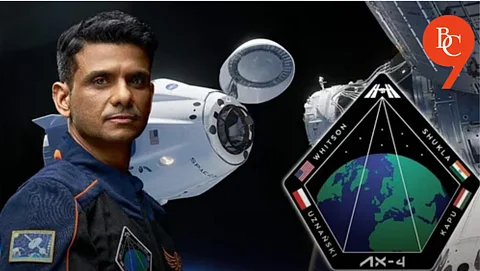

India has invested a reported ₹550 crore to secure a seat for Indian Air Force Group Captain and ISRO astronaut Shubhanshu Shukla on Axiom Mission 4 (Ax-4), making him the first Indian to visit the International Space Station (ISS). This mission not only marks India’s return to human spaceflight after four decades but also signals a new era for the nation’s space program, with Shukla’s journey expected to yield invaluable scientific and strategic benefits.
Launched on June 25, 2025, from NASA’s Kennedy Space Center, the Ax-4 mission is a collaboration between Axiom Space, SpaceX, NASA, and international partners. Shubhanshu Shukla, serving as the mission pilot, is joined by Commander Peggy Whitson (USA), Tibor Kapu (Hungary), and Slawosz Uznanski-Wisniewski (Poland). The crew docked successfully with the ISS on June 26, marking a proud moment celebrated across India.
India, Poland, and Hungary each funded their astronaut’s participation, with Hungary previously disclosing a $100 million investment for its seat. While official Indian sources have not confirmed the exact figure, multiple reports indicate India’s expenditure is approximately ₹550 crore, reflecting the high cost and strategic significance of the mission.
During his two-week stay aboard the ISS, Shukla will lead seven India-driven experiments, focusing on microgravity’s effects on seeds, algae, and human physiology. These studies, conducted in partnership with NASA and ISRO, are designed to advance knowledge in life sciences, agriculture, and health, with potential applications for future long-duration missions and India’s own Gaganyaan program.
The experiments include growing methi (fenugreek) and moong dal (mung beans) in space, as well as studying tardigrades microscopic organisms known for their resilience in extreme environments. These efforts underscore India’s commitment to leveraging space for scientific advancement and global collaboration.
Prime Minister Narendra Modi and President Droupadi Murmu hailed the mission as a “proud moment for 1.4 billion Indians,” emphasizing the symbolism of India’s growing stature in global space exploration. The mission is widely seen as a critical stepping stone for the Gaganyaan human spaceflight program, which aims to send Indian astronauts into space aboard indigenous vehicles by 2027.
Shukla’s journey is not just a personal achievement but a strategic milestone. Human spaceflight is increasingly viewed as a marker of technological and geopolitical influence, opening new avenues for scientific research, commercial opportunities, and international cooperation.
Shubhanshu Shukla’s successful mission on Ax-4 is expected to provide ISRO with vital experience in crewed space operations, mission planning, and international collaboration. The learnings will directly inform the Gaganyaan program and India’s broader ambitions, including plans for a national space station and lunar missions by 2040.
